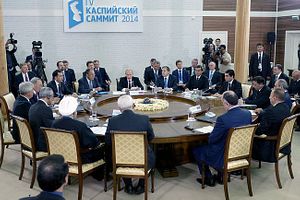Presidents of the five countries surrounding the Caspian Sea held a summit last week in Astrakhan, on the Russian shore of the sea. And while the Russian hosts declared that the summit moved the Caspian countries closer than ever to a final resolution of the stickiest issue – formalizing the sea’s international boundaries – strong differences of opinion linger not far under the surface.
Since the collapse of the Soviet Union, the question of who controls which parts of the Caspian has been in dispute. The disagreements have resulted in uncertainty over the sea’s substantial oil and natural gas reserves, and has helped to fuel a naval arms race on the sea.
After the summit, Russian President Vladimir Putin announced that “we have every reason to expect that we will soon have the convention ready for signing and will thus successfully conclude the work that has been going on for 18 years now.” A Russian presidential aide said that the long-debated agreement could be signed next year.
But it’s not clear what breakthrough has been made. Iran has been the most difficult negotiator, insisting on the principle that each of the five states on the sea should control an equal area – which, not coincidentally, would give it more than the 12 percent the other four countries believe it should control.
And Iran, through its official government statements and media, did not mention the Astrakhan breakthrough in the status negotiations. Tehran, instead, focused on the five countries’ agreement to forbid foreign military presence on the sea. That has been a long-standing demand of both Russia and Iran, which have mistrusted Washington’s efforts to help the other three countries – Azerbaijan, Kazakhstan and Turkmenistan – build up their navies. “The [summit] declaration sets out a fundamental principle for guaranteeing stability and security, namely, that only the Caspian littoral states have the right to have their armed forces present on the Caspian,” Putin said.
But Azerbaijan, which has been Washington’s closest naval ally on the Caspian, appeared to push back against the notion that the issue was settled: “We are in favor of peace in the Caspian Sea,” said Deputy Foreign Minister Khalaf Khalafov in a press conference after the summit. “The countries need to be careful while organizing marine defense and be based on balanced armament. The issue of arming and the security factor are also reflected in the joint statement. However, a balanced formula is yet to be prepared.”
One thing neither Russia nor Iran seemed to mention: the question of an undersea pipeline that Turkmenistan and Azerbaijan would like to build to transport natural gas from Turkmenistan to Europe. Both Moscow and Tehran have opposed such a project, and have argued that a Caspian agreement should include a provision that all five countries should agree on such major infrastructure projects.
But Turkmenistan President Gurbanguly Berdymukhammedov, discussing the results of the summit, reiterated that “Turkmenistan is firmly convinced that the construction of these pipelines is the sovereign right of the governments through whose section of the seafloor they pass.”
Putin did allow that not all issues had been resolved: “I cannot claim that all issues have been settled completely, but there are far fewer outstanding matters now.” But if an agreement is truly to be signed by 2015, it seems that some big compromises are going to have to be made quickly.

































